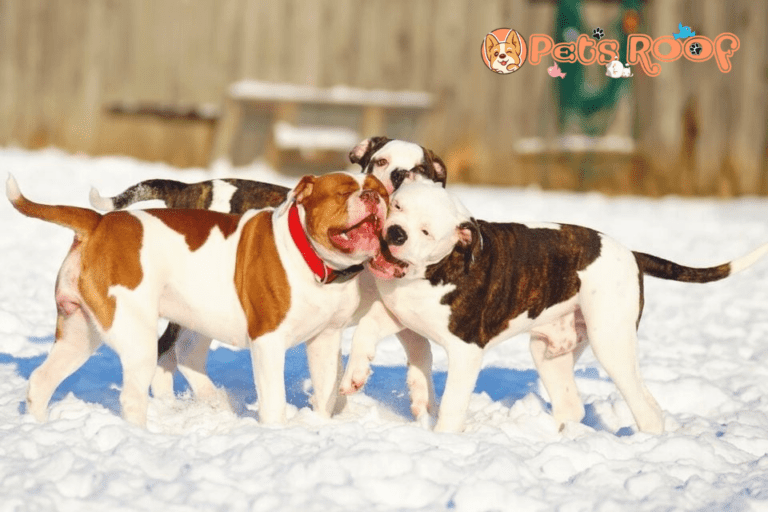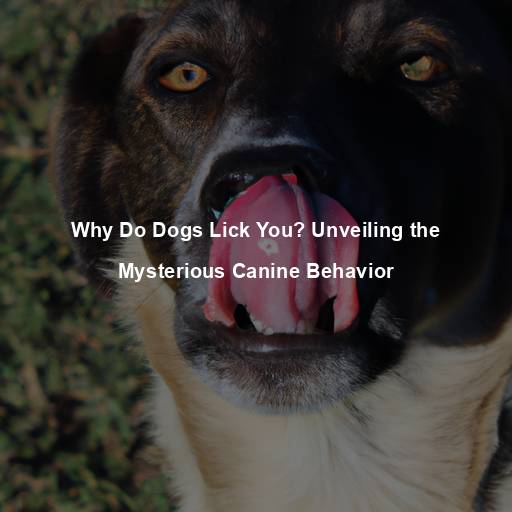Can Dogs Get COVID-19? Unveiling the Truth Behind Canine Coronavirus Infection
Last Updated on July 31, 2023 by Evan
Contents
- 1 Understanding the Impact of COVID-19 on Dogs
- 2 Exploring the Possibility of Canine COVID-19 Transmission
- 3 Can Dogs Become Symptomatic?
- 4 Mitigating the Risk of Canine COVID-19 Transmission
- 5 The Bottom Line: Dogs and COVID-19
- 6 Addressing Common Misconceptions about COVID-19 and Dogs
- 7 Supporting the Well-being of Dogs during the Pandemic
- 8 Remaining Informed and Adapting to the Changing Landscape
- 9 The Ongoing Bond Between Humans and Dogs
- 10 The Role of Canine COVID-19 Testing and Surveillance
- 11 The Importance of Responsible Pet Ownership during a Pandemic
- 12 Looking Towards a Brighter Future for Dogs and Humans
- 13 FAQs: Can Dogs Get COVID?
Understanding the Impact of COVID-19 on Dogs
In a world gripped by the relentless waves of a global pandemic, the topic that has consumed the thoughts of humans everywhere is COVID-19. But amidst the chaos and uncertainty, a new question has emerged, casting a shadow of perplexity. Can our beloved canine companions fall victim to this invisible enemy? This query, tinged with worry and curiosity, has ignited a fervent search for answers among pet owners.
As we delve into the topic of COVID-19 and its impact on our furry friends, it becomes crucial to grasp the intricacies surrounding canine coronavirus infection. This intricate realm encompasses a diverse array of viruses that predominantly target dogs. Yet, let us tread with caution and bear in mind that this multifaceted web includes various strains of canine coronavirus, and not every strain is intertwined with the COVID-19 pandemic.
When it comes to viruses, it’s important to understand that not all members of the same family are cut from the same cloth. Take, for instance, canine coronavirus and COVID-19 – they may share a familial bond, but they’re as different as night and day. Canine coronavirus has a penchant for causing upset tummies in our beloved furry friends, while COVID-19, caused by the notorious SARS-CoV-2, has made its way into the respiratory systems of humans, causing quite a stir. Ah, the perplexities of viruses and their diverse interests!
Exploring the Possibility of Canine COVID-19 Transmission
The Case of Reverse Zoonosis
Intriguingly, the concept of reverse zoonosis revolves around the transmission of diseases, in a rather unexpected twist, from humans to animals. Take COVID-19 for instance, the reverse zoonosis scenario would involve the perplexing transfer of the SARS-CoV-2 virus from human hosts to our furry canine companions. Fascinatingly, although there have been sporadic reports of dogs testing positive for COVID-19, the occurrence of reverse zoonosis remains quite puzzlingly scarce in the grand scheme of things.
Understanding Human-to-Dog Transmission
The limited instances of COVID-19 in dogs can mostly be attributed to close contact with infected individuals. Dogs living in households with COVID-19-positive owners have a higher risk of contracting the virus. It is believed that the virus can be transmitted through respiratory droplets or contaminated surfaces. However, it is important to note that dogs are not considered significant carriers or spreaders of the virus.
Can Dogs Become Symptomatic?
Asymptomatic Infections in Dogs
In most cases, dogs infected with COVID-19 remain asymptomatic or exhibit only mild symptoms. This means that they do not display visible signs of illness, making it challenging to identify whether they have contracted the virus. As a result, routine testing and monitoring are crucial, especially in households with COVID-19-positive individuals.
Rare Cases of Symptomatic Infections
Although most dogs infected with COVID-19 show no symptoms, there have been isolated cases where symptoms have been observed. These symptomatic dogs may experience mild respiratory issues, particularly coughing or sneezing. Nevertheless, it is crucial to understand that such occurrences are quite rare and do not represent the typical scenario for our furry companions.
Mitigating the Risk of Canine COVID-19 Transmission
Practicing Good Hygiene
In our current turbulent times, where uncertainty lurks around every corner, it becomes paramount for pet owners to navigate the perplexing realm of COVID-19 and its potential impacts on our beloved canine companions. As we grapple with this unprecedented global health challenge, a ray of hope emerges in the form of good hygiene practices. By diligently washing our hands, maintaining a safe distance from our furry friends during our own battles with the virus, and vigilantly keeping their living spaces clean, we can strive towards protecting our four-legged family members from this insidious threat. So let us embark on this journey towards ensuring the well-being of our loyal companions, as we triumph over adversity together.
Veterinary Guidance and Testing
If you’ve got a hunch that your furry friend might have come into contact with the dreaded COVID-19 or is acting a bit off, don’t hesitate to reach out to a knowledgeable vet. These healthcare superheroes can administer the right tests and offer expert advice to protect the precious health of your beloved pet and keep their human companions safe and sound, too. Don’t let uncertainty gnaw at you—seek professional guidance and put your worries to rest.
The Bottom Line: Dogs and COVID-19
In the realm of COVID-19, there exists a whirlwind of information swirling around our beloved canines. Although it is not entirely unheard of for dogs to contract the virus, it is crucial to acknowledge that they do not play a prominent role in its transmission. The majority of furry friends remain unaffected or simply display minimal signs of illness. By adhering to the principles of impeccable hygiene and reaching out to veterinary professionals when needed, pet owners can effectively navigate the enigmatic domain of canine COVID-19 transmission.
In an ever-shifting landscape of COVID-19 knowledge, it behooves us to acknowledge the perpetual ripples of research and maintain unwavering vigilance. As we immerse ourselves in the freshest currents of information and heed the wise words of experts, we safeguard the well-being of our cherished canine counterparts amid these perplexing and trying circumstances.
Disclaimer: The information provided in this article is for educational purposes only and should not be considered a substitute for professional veterinary advice. Always consult with a qualified veterinarian for guidance on your pet’s specific health needs.## Exploring the Role of Vaccination in Canine COVID-19 Prevention
The Importance of Vaccination
In today’s rapidly evolving landscape of infectious diseases, vaccination has emerged as a pivotal shield against their propagation, be it among people or our fellow furry companions. As the global community continues to grapple with the unprecedented challenges posed by the COVID-19 pandemic, the notion of vaccinating dogs against this notorious virus has captured widespread curiosity. Yet, navigating through this perplexing maze of information, it becomes crucial to recognize the glaring absence of a dedicated COVID-19 vaccine specifically formulated for our beloved canines.
Leveraging Existing Vaccines
With the ongoing battle against COVID-19, it’s only natural that our furry companions come into the picture. Although there isn’t a specific vaccine for dogs, it’s intriguing to explore how certain routine vaccinations may have a hidden power in bolstering their overall health and immune response. By receiving vaccinations against respiratory diseases like canine distemper and kennel cough, it’s plausible that our canine friends could potentially have a fighting chance against the virus, lessening the intensity of symptoms if they were to become infected. An unexpected twist in the tale of our pets’ well-being!
Consultation with Veterinarians
As responsible fur parents, it’s essential to have a heart-to-heart with our trusted veterinarians about our fur babies’ vaccination needs. To ensure optimal pet health, these knowledgeable experts can offer tailored advice on which vaccines are paw-fect for our individual doggo’s needs, taking into account factors such as age, overall well-being, and potential encounters that may bring them nose-to-nose with risks. So let’s embrace the bewilderment and seek the wisdom of these animal whisperers to create a vaccination plan as unique as our four-legged companions.
Addressing Common Misconceptions about COVID-19 and Dogs
Dogs as a Source of COVID-19
There have been misconceptions and concerns about dogs acting as a potential source of COVID-19. It is important to clarify that dogs themselves do not generate the virus. They can only contract it from close contact with infected individuals or contaminated environments.
The Risk of SARS-CoV-2 Mutations in Dogs
It’s time to bust another myth surrounding the SARS-CoV-2 virus and our furry friends. Despite popular belief, there is no concrete evidence to support the notion that dogs hold the power to mutate the virus and put humans at even greater risk. The focus should continue to be on human-to-human transmission, as that remains the primary concern. So, rest assured, our canine companions are not the perplexing source of this mutating mystery.
Dogs and Long-Term Effects of COVID-19
With the ongoing exploration into the lasting impacts of COVID-19 on our own species, a pertinent question arises: what about our furry companions? While some have expressed trepidation about potential long-term effects of the virus in dogs, the existing understanding indicates that our four-legged friends typically endure mild symptoms or remain entirely asymptomatic. The enigma persists, however, as the true repercussions, if any, that may manifest in the long run are yet to be untangled from the intricate fabric of this perplexing virus.
Supporting the Well-being of Dogs during the Pandemic
Maintaining Routine Care
In these unprecedented times, the health and happiness of our beloved pets deserve our utmost attention and care. It is absolutely imperative that we remain steadfast in our commitment to their well-being by ensuring they receive the essential veterinary care they need. From crucial vaccinations to regular check-ups, as well as proactive measures against fleas, ticks, and other parasites, let us make their health a top priority and provide them with the love and protection they deserve.
Mental Stimulation and Exercise
Dogs thrive on mental stimulation and physical exercise. With potential restrictions or limitations on outdoor activities during the pandemic, it is important for pet owners to find creative ways to provide mental stimulation and physical exercise within the confines of their homes. This can include interactive toys, puzzle games, obedience training, and indoor exercise routines.
Emotional Support for Dogs
Dogs can sense changes in their environment and the emotional state of their human companions. It is important to provide them with a calm and supportive environment, especially during times of stress and uncertainty. Spending quality time together, providing reassurance, and maintaining a consistent routine can help alleviate anxiety and promote emotional well-being.
Remaining Informed and Adapting to the Changing Landscape
Staying Updated on Research
As the scientific understanding of COVID-19 continues to evolve, it is essential for pet owners to stay informed about the latest research and recommendations. This includes regularly checking reputable sources such as veterinary associations, government health agencies, and trusted veterinary professionals.
Adapting to Local Guidelines
Nurturing our beloved furry friends during these uncertain times can leave us feeling both perplexed and overwhelmed. Rest assured, dear pet owners, that there is a shimmering glimmer of hope amidst this storm of bursting information. Each region, with its own enigmatic guidelines and recommendations, dances to its own beat when it comes to pets and COVID-19. As a responsible pet guardian, it is paramount to embark on a quest for knowledge, arming ourselves with the intricate web of guidelines woven specifically for our local domains.
The Ongoing Bond Between Humans and Dogs
Dogs, those charming creatures who have enchanted humanity for centuries, hold an indescribable ability to nourish our souls with unconditional affection and unwavering devotion. The tumultuous winds of the COVID-19 pandemic have unexpectedly revealed the magnitude of this extraordinary connection, as countless individuals have sought solace and refuge in the companionship of their furry confidants amidst these perplexing days. As our world becomes a mosaic of uncertainty, dogs remind us that amidst the chaos, there is profound beauty in a loyal friend by our side.
In these tumultuous times, it is paramount for pet guardians to place their furry friends at the forefront of their minds. Although the likelihood of COVID-19 transmission to dogs is minimal, ensuring the well-being and safeguarding the health of our beloved companions should be a top priority. By staying abreast of the latest information, heeding the guidance of experts, and showering our canine confidants with ample love and care, we can forge a path through this bewildering era, fortifying the unbreakable bond that exists between humans and their ever-devoted four-legged pals.
Disclaimer: The information provided in this article is for educational purposes only and should not be considered a substitute for professional veterinary advice. Always consult with a qualified veterinarian for guidance on your pet’s specific health needs.## Exploring the Potential Risks of COVID-19 Transmission from Dogs to Humans
Understanding the Scope of Transmission
Amidst the swirling concerns surrounding the COVID-19 pandemic, an elusive specter emerges, drawing attention to the potential transmission of the virus from our faithful canine companions to us fragile humans. Yet, let us not be consumed by fear, for it is crucial to discern the sporadic nature of these occurrences, for dogs themselves do not bear the burden of being significant enablers in the viral web of contagion.
Transmission through Respiratory Droplets
When it comes to our furry friends and COVID-19, there seems to be some perplexity surrounding transmission. The prevailing belief is that our canine companions can contract the virus through close contact with respiratory droplets from their human counterparts. This can occur when our beloved pooches find themselves in the vicinity of COVID-19-positive owners engaging in activities like coughing, sneezing, or even speaking with gusto. To ensure the well-being of both humans and their four-legged companions, experts advise pet owners to adopt good respiratory hygiene habits, like keeping their mouths and noses covered when in close proximity to their pets.
Preventive Measures for Dog Owners
To mitigate the risk of potential transmission from dogs to humans, pet owners should follow certain preventive measures. These include practicing good hand hygiene by washing hands thoroughly with soap and water before and after interacting with their pets, avoiding close contact with their pets if they are COVID-19 positive, and regularly cleaning and disinfecting pet supplies and living areas.
The Role of Canine COVID-19 Testing and Surveillance
Testing for Canine COVID-19
When it comes to COVID-19 testing for our furry friends, the path is filled with hurdles and uncertainties. The availability of specialized diagnostic tests catering to dogs seems to be a rarity, exacerbating the challenge. As we navigate this perplexing situation, testing protocols are often implemented on a case-by-case basis, primarily when dogs have come into close contact with confirmed virus carriers or exhibit symptoms aligning with the notorious illness.
Surveillance and Monitoring
In the realm of dogdom, widespread COVID-19 testing remains a distant howl in the wind, much to the perplexity of dog lovers everywhere. However, in this canine mystery, surveillance and monitoring emerge as unsung heroes, shedding light on the prevalence and impact of the virus among our furry companions. Through diligent tracking and reporting, researchers and public health authorities hope to unravel the enigma of transmission dynamics and uncover any lurking risks that the virus might present to our precious four-legged pals.
Advancements in Canine COVID-19 Research
New developments in the realm of COVID-19 research for dogs have sparked a whirlwind of excitement and curiosity. As scientists dive deeper into the mysterious virus and its effect on our furry companions, a new horizon of understanding begins to take shape. Seeking to unravel the enigma surrounding susceptibility, transmission, and clinical repercussions, ongoing studies pave the way towards powerful prevention and control strategies, shielding not only our four-legged friends but also the realm of human health.
The Importance of Responsible Pet Ownership during a Pandemic
Commitment to Pet Care
In these perplexing times, when uncertainty is the name of the game, taking charge of our furry friends’ well-being is paramount. As responsible pet parents, we must delve into the burstiness of their needs and make their health a top priority. From nourishing their bellies with the right sustenance to ensuring they get their daily dose of exercise, we embark on an adventure of pet ownership unlike any other. Let us not forget the importance of regular veterinary care, with vaccinations, preventive treatments, and those annual check-ups that keep our canines thriving.
Emergency Preparedness
In uncertain times, it is essential for pet owners to have an emergency plan in place for their dogs. This plan should include arrangements for their pets’ care in the event of illness or hospitalization. Identifying a trusted caregiver, ensuring an adequate supply of food and medication, and having updated identification tags or microchips can help ensure the safety and well-being of dogs during emergencies.
Mental and Emotional Support for Dogs
We all know that dogs are incredibly sensitive creatures, and sometimes, just like us, they can feel a little overwhelmed by all the uncertainty that life throws their way. As pet owners, it is our duty to be their rock, to create a safe haven where they can find solace and feel supported. By keeping a consistent routine, providing plenty of mental and physical stimulation, and showering them with positive reinforcement and interactive playtime, we can help our furry friends navigate the ups and downs of life with a wagging tail and a happy heart.
Looking Towards a Brighter Future for Dogs and Humans
A Resilient Bond
In the midst of these tumultuous times, the COVID-19 crisis has shed light on the remarkable connection between humans and dogs. As we navigate these uncertain waters, it becomes increasingly evident that dogs play an essential role in our lives. Their undying loyalty and boundless affection serve as a poignant reminder of the profound impact they have on our well-being. Amidst chaos and confusion, the unwavering bond between humans and dogs is a beacon of hope and solace.
Continued Vigilance and Adaptation
As the world continues to battle the COVID-19 pandemic, it is crucial for pet owners to remain vigilant and adapt to the changing circumstances. Staying informed, following public health guidelines, and seeking veterinary advice when needed can help safeguard the health and well-being of both humans and their beloved canine companions.
A Message of Hope
As we navigate through these tumultuous times, the resilience and unwavering bond between humans and dogs continues to emerge as a beacon of hope. While we still find ourselves on an uncertain path, the indomitable spirit that resides within both species serves as a source of inspiration. Together, we can overcome the challenges posed by COVID-19, nurturing a future where the companionship of dogs brings us comfort, joy, and renewed strength.
Disclaimer: The information provided in this article is for educational purposes only and should not be considered a substitute for professional veterinary advice. Always consult with a qualified veterinarian for guidance on your pet’s specific health needs.
FAQs: Can Dogs Get COVID?
Can dogs get COVID-19?
It may come as a surprise, but our beloved canine companions are not completely immune to the clutches of COVID-19. Yes, it’s true – dogs can, in fact, contract the virus. Now, before you start panicking about paw sanitizers and puppy face masks, let’s calm those racing heartbeats with a dose of reality. While it is a possibility, let’s remember that this occurrence is as rare as a diamond-studded dog collar. Studies have shown that our furry friends exhibit a higher level of resistance to the notorious SARS-CoV-2 virus compared to us mere humans. However, let it be known that dogs can still fall victim to the invisible enemy if they tread upon contaminated grounds or unknowingly cozy up to an infected individual. So, while it’s important to stay informed and take precautions, rest assured that our trusty companions are not walking ticking virus time bombs. Keep wagging those tails, but with a dab of vigilance!
What are the symptoms of COVID-19 in dogs?
The majority of dogs infected with COVID-19 show very mild to no symptoms at all. In some rare cases, dogs may display mild respiratory symptoms such as coughing, sneezing, or breathing difficulties. It is important to remember that the symptoms observed in dogs are usually much milder than those experienced by humans. If you notice any concerning symptoms in your dog, it is recommended to contact your veterinarian for guidance.
Can dogs transmit COVID-19 to humans?
The burning question on every dog lover’s mind: can our furry friends actually transmit COVID-19? Take a deep breath and let me clear the air. While it may be possible for our canine companions to contract the virus, the odds of them playing the role of the unwitting carrier are definitely stacked against them. The verdict? Human-to-human transmission remains the primary culprit in this pandemic saga. Of course, it doesn’t hurt to err on the side of caution by practicing good old-fashioned hygiene, like diligent hand-washing and keeping your distance from Rover if you happen to be under the weather or have had a positive COVID-19 test. Stay safe, pet lovers!
Should I take any precautions with my dog during the pandemic?
In these peculiar times, ensuring the well-being of our furry companions has become more complex than ever. Curbing the perplexing spread of COVID-19 demands us to take certain measures when it comes to our four-legged friends. Exercising prudence, it is recommended to restrain our dogs’ interactions with outsiders and abstain from bustling locales that may breed viral transmission. Scrupulously sanitizing our dogs’ cherished possessions, ranging from playful toys to cozy bedding, with pet-friendly disinfectants is a must. Furthermore, upholding impeccable personal hygiene by diligently washing our hands before and after handling our dear dogs can serve as an additional barrier against an enigmatic transmission.
Can dogs be tested for COVID-19?
Yes, dogs can be tested for COVID-19. If you suspect your dog has been exposed to the virus or if they are displaying symptoms consistent with COVID-19, it is recommended to contact your veterinarian for guidance. They will be able to advise you on the testing options available in your area and guide you through the necessary steps.
Can dogs be vaccinated against COVID-19?
As we navigate the ever-evolving landscape of the COVID-19 pandemic, it’s crucial to address a question that has sparked curiosity among pet owners: are there any authorized vaccines for our canine companions? Interestingly, the focus of vaccination efforts has predominantly centered around humans, leaving our loyal furry friends awaiting their turn. To navigate this perplexing matter, it is imperative to seek guidance from trustworthy sources, such as veterinary associations or public health agencies, who can provide the latest updates on COVID-19 and its potential implications for our beloved dogs.
It’s worth noting that although there have been reported cases of dogs contracting COVID-19, it’s still considered a relatively uncommon occurrence. The likelihood of transmission from dogs to humans is also considered to be minimal. However, if you have any doubts or inquiries about your furry companion’s well-being, it’s highly recommended to seek guidance and expert advice from a trusted veterinarian.






